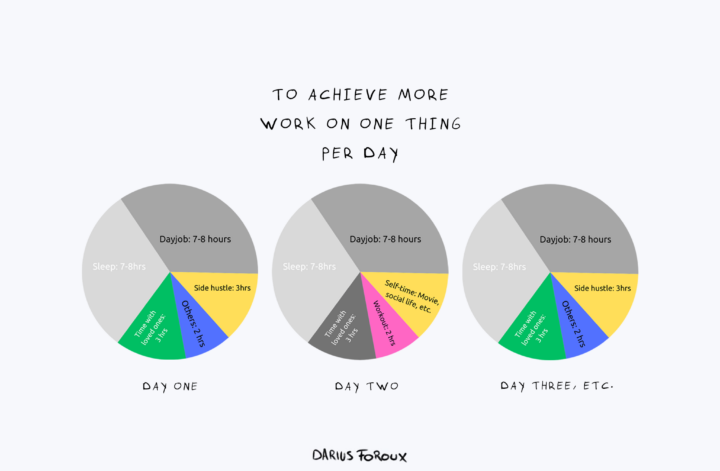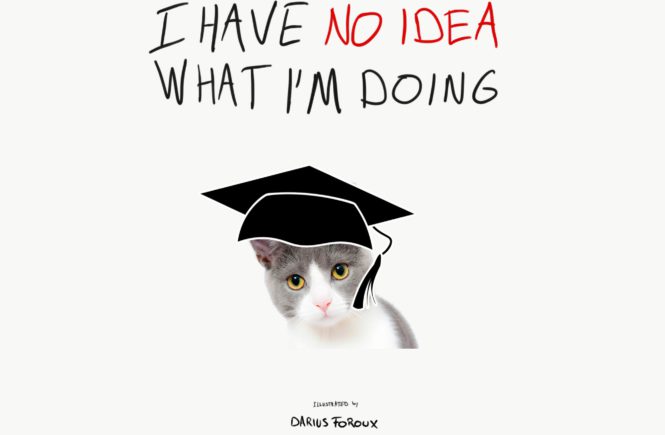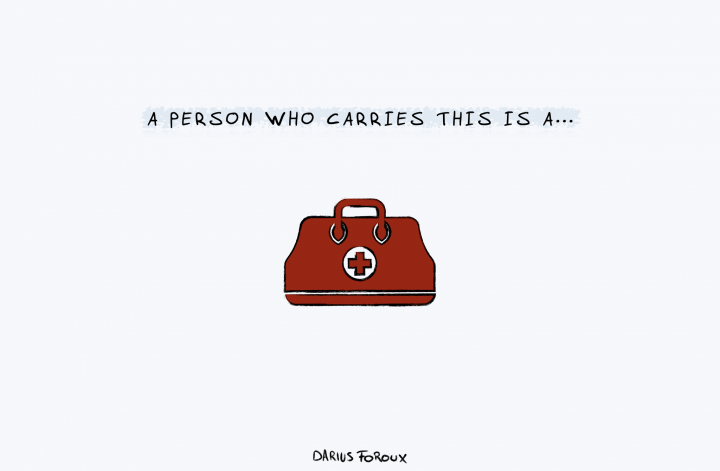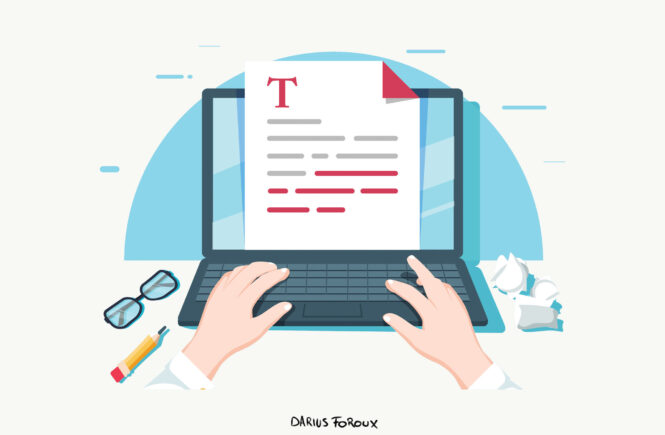Science keeps telling everyone that multitasking is bad.1Source: NCBI When you multitask, it takes a toll on your productivity.2Source: APA.org
Switching between two different technologies (like watching TV while posting on social media) can negatively affect your long-term and working memory.3Source: Springer
But people still do it. Research even found out why: Multitaskers feel that they’re getting more things done, even if multitasking has little positive correlation to their effectiveness.4Source: PLOS Journal
I get why we have the urge to multitask. We want to make the most of our 24 hours. We want to get more things done in less time. If you’re reading this, you’re likely among the ambitious folks who have a bunch of goals you want to achieve.
So this article is not about how to finish your work while talking to someone on a phone or answer your emails faster while scrolling on social media.
The “right” way to multitask is this: Work on different areas of your life during the same period, but not at the same time. Let me explain.
How a productive day can look like
Let’s say you’re an employee at a large company that isn’t too strict about working hours. And one of your goals is to start your own business or freelance career. This is what a productive day can look like for you:
- You wake up a few hours before work, go for a run, then shower, and get ready.
- At work, you execute the Pomodoro strategy to get things done. Ideally, you finish all your work before lunch.
- You take a short lunch break and eat something healthy.
- Then, you allocate 45 minutes to work on your side hustle. You can spend that time doing research, pitching to potential clients, building a product, etc.
- When you get home, you can spend the evening doing more work on your side hustle. Or attend a class that improves a specific skill (like piano, a different language, or upgrading yourself with an income-generating skill). You may also choose to work on that book you’ve been wanting to write. Or simply go out with friends.
- Afterward, you go to sleep. And do roughly the same the following day.
A day like that is highly productive.
You improved your fitness and health; you worked on your career (both on your job and your side hustle/passion project); you upgraded your skillset (whether that’s learning the piano, speaking a new language, etc.); you finished a few pages of your new book; and you maintained your mental well-being by having fun — which is very important.
These are all small progress that would compound as you do them consistently over weeks and months. Each day can’t always be as productive. But consistency will help even things out.
When you focus on ONE task at a time while working on different areas of your life, the progress you experience can be astounding. That’s the best way to multitask and make a lot of progress.
Achieving big goals takes time no matter how good you are
People tend to overestimate their competence.5Source: APA.org Some time ago, I was talking to someone who said they aimed to buy a Rolls Royce after two years of starting a business.
At the time, he was planning to start his first business. I don’t want to be a party pooper, but it’s highly unlikely you can start a business and make a lot of money within two years.
We all need to be optimists, especially when it comes to our careers. But sometimes, we also need to be aware of the numbers.
Recent data shows that 20.8% of private-sector businesses fail in their first year. 48.4% don’t last five years. And in ten years, 65.1% of these businesses would have failed.6Source: Lending Tree
If most businesses can’t even survive for five years — what are the odds that a new business can skyrocket its earnings to afford a $300K car in two years?
Facebook founder, Mark Zuckerberg, came from Harvard. Thanks to being in an elite Ivy League university, Zuckerberg was surrounded by a network of powerful, well-connected people.
He founded his company in an environment that easily helped him to scale his business. And yet, Facebook took five years to earn its first profit.7Source: The Atlantic
Even if you’re not planning to run a business, every big goal takes time. That applies to writing a book, changing careers, getting a high-paying job, etc.
It would be great if we got super lucky and succeeded immediately. But in my experience, most people need more time.
The best we can do is to make small, consistent progress by working on different areas of our lives simultaneously.
Assess your priorities
My researcher and writing assistant, John, was rushed to the hospital back in 2021 before the COVID vaccine became available. At first, because of his symptoms, he thought it might be COVID and, though he’s young and healthy, he figured he might be one of those unlucky folks who can still die from the virus.
He’s alive and well now. But at that moment, the first thought John had was: If I die today, is there something I’d deeply regret?
He realized he’d deeply regret it if he died without finishing his first novel. So after he recovered, he focused most of his energy outside work on writing his book.
Here’s the thing: There’s a huge difference between doing many things and doing the right things. So try asking yourself this:
“If I only have 12 months left to live, what are the top 3 things I want to achieve in that year?”
That thought experiment might seem dark. But we don’t truly know if we’ll be alive and well next year. And this thought experiment forces us to reconsider what truly matters.
You can do more than one thing (but you have to be strategic)
I think it’s possible to include some multitasking in your routine. For example, I’m writing this as I’m walking/working on my treadmill desk. Also, recent research has shown that walking improves our focus during virtual meetings.8Source: Science Daily
The key is to be strategic. I can’t write this article and listen to an audiobook at the same time. However, I can listen to an audiobook while I’m driving.
I can also build a business and get in better shape. But I can’t add in other big priorities like traveling, buying a new house, and writing a book at the same time.
So be ambitious and stay active. Just don’t overload yourself. When you notice you can’t focus on your important tasks, it means you’re doing too much.
Take it down one notch and then keep ploughing ahead!




